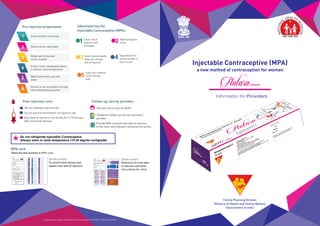Antara_provider_leaflet.pdf for all nurses
- 1. Family Planning Division Ministry of Health and Family Welfare Government of India Injectable Contraceptive (MPA) a new method of contraception for women Information for Providers Developed with support from National Technical Support Unit (NTSU), FP Division, MoHFW Post-injection care: Do not massage injection site Do not give hot fomentation on injection site Ask client to remain in the facility for 5-10 minutes after receiving injection Follow-up care by provider: Provide MPA card with due date of injection to the client and maintain counterfoil at facility Periodic home visits by ASHA Telephonic follow-up care by counselor/ provider Ensure proper counseling Check vial for expiry date Shake well to dissolve micro-crystals If vial is cold, rub between palms to achieve room temperature Wash hands with soap and water 5 6 Ensure no air is pushed in syringe while withdrawing solution Pre-injection preparation MPA card : There are two sections in MPA card: Facility section: To record client details and update next date of injection Client section: Reference for next date of injection and other instructions for client Do not refrigerate Injectable Contraceptive Always store in room temperature (15-30 degree centigrade) Administering the Injectable Contraceptive (MPA): Clean site of injection with antiseptic Allow antiseptic to dry Insert sterile needle deep into chosen site of injection Aspirate ?rst to ensure needle is not in a vein Inject the contents of the syringe fully 1 2 3 4 5
- 2. How does Injectable Contraceptive (MPA) work? ? It prevents monthly ovulation ? Thickens cervical mucus thus blocking sperms ? Thins endometrium making implantation of egg dif?cult Injectable (MPA) is an intramuscular hormonal contraceptive method for women that provides 3 months¡¯ protection with a single dose. It is a safe and suitable method for nearly all women, including those who are unmarried and have no children. What if a client misses her dose as per due date? ? Upto 2 weeks prior to assigned date of dose; Or ? Upto 4 weeks post the assigned date Injectable contraceptive can be given: Injectable contraceptive can be opted at any time after proper screening. The ?rst dose can be taken: ? Anytime after regular menstruation; Or ? After 6 weeks of delivery; Or ? Immediately after abortion When can one opt for Injectable Contraceptive (MPA)? What is Injectable Contraceptive (MPA)? Who can opt for it? If the due date exceeds by 4 weeks, a dose can be given immediately (after ruling out pregnancy), along with a backup method (condom) to be used for the next 7 days. Menstrual irregularities: Light / heavy bleeding or amenorrhoea Slight weight gain No protection against HIV/STDs Key considerations to be shared with client prior to administering Injectable Contraceptive (MPA): Slight loss in BMD during ?rst 2 years of use Injectable contraceptive should not be given to a woman with: Unexplained vaginal bleeding Stroke or severe diabetes Breast cancer (past / present) Active hepatitis or liver tumor Desire for rapid return to fertility Misconceptions about Injectable Contraceptives (MPA): infertility in women It leads to Wrong used by adolescent women It cannot be Wrong It leads to changes in blood pressure & blood coagulation Wrong It may cause cancer (breast / cervix / endometrium / liver) Wrong It leads to fracture abortion or birth defects It may cause Wrong Wrong Each injection gives protection for 90 days (i.e. 3 months). Ensures clients¡¯ privacy and con?dentiality Why Injectable Contraceptive is the right choice for you It is a good option for women who want to delay childbearing for the ?rst and subsequent births It can easily be administered in the arm, thighs or buttocks It is an effective and safe option for breast-feeding women (after 6 weeks of delivery) It is a safe method for most women, including those with HIV/AIDS It reduces menstrual cramps and improves anemia by reducing blood loss It is a reversible method of contraception with no effect on fertility Counseling is a key component for acceptance and continuation of Injectable Contraceptives (MPA) Client needs to be counseled on Slight changes in weight or mood swings Delay in return to fertility (7-10 months from last injection) Need for timely and regular dose every 3 months Next date of injection Possible changes in menstruation cycle (prolonged/excessive bleeding / amenorrhea)

